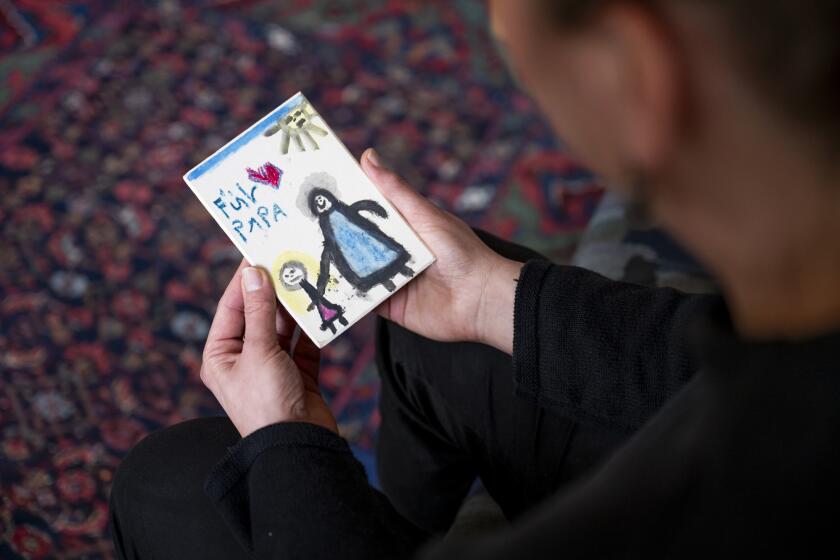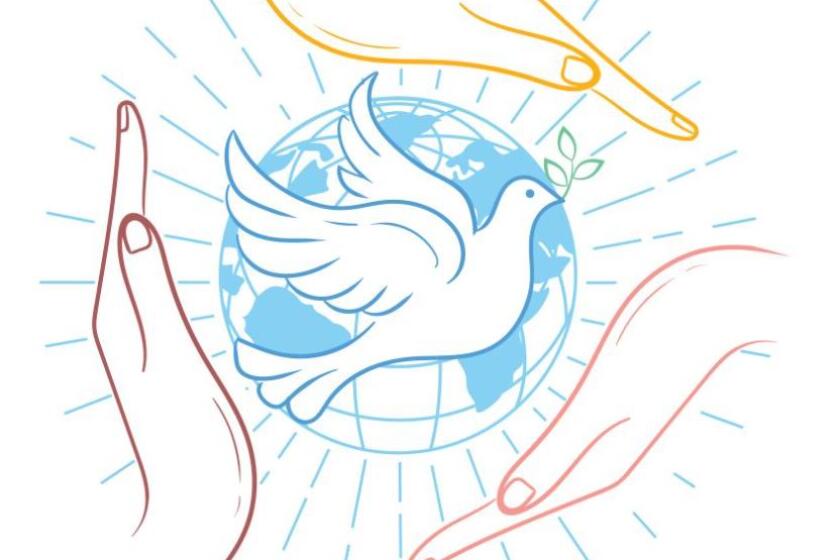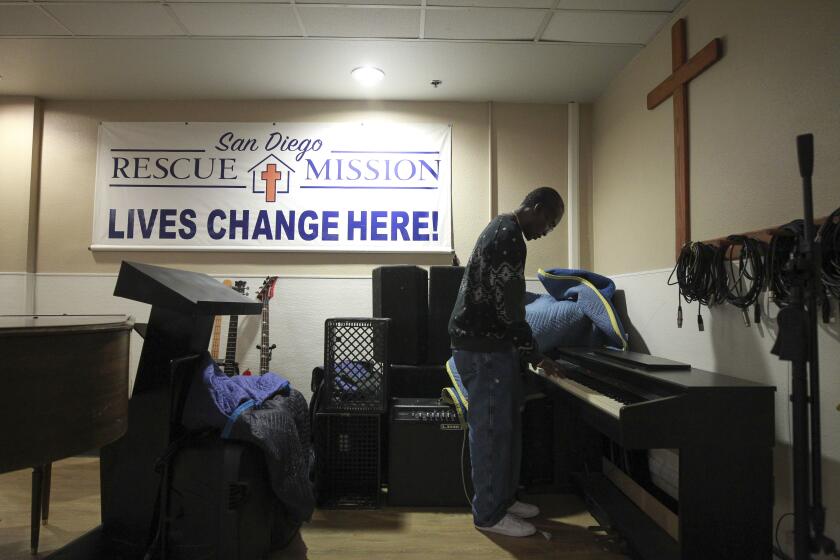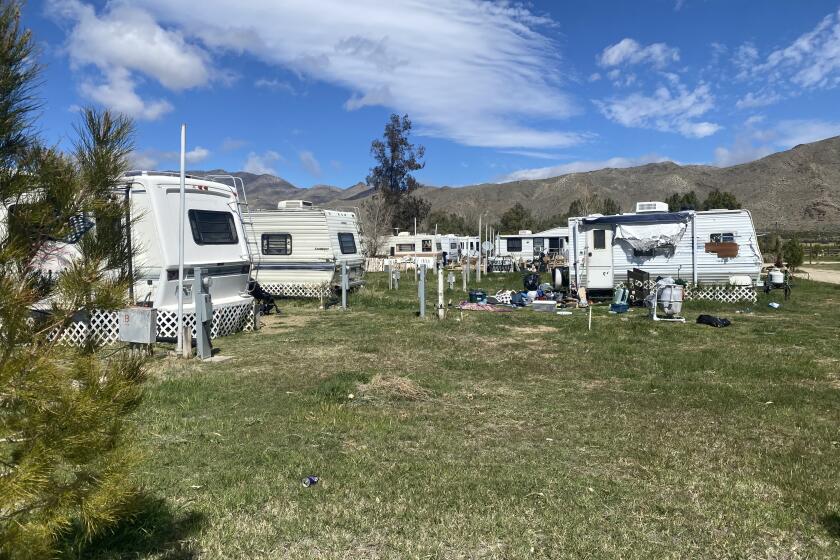Opinion: My former student was about to earn a bachelor’s degree. Instead, a relapse led to his death.
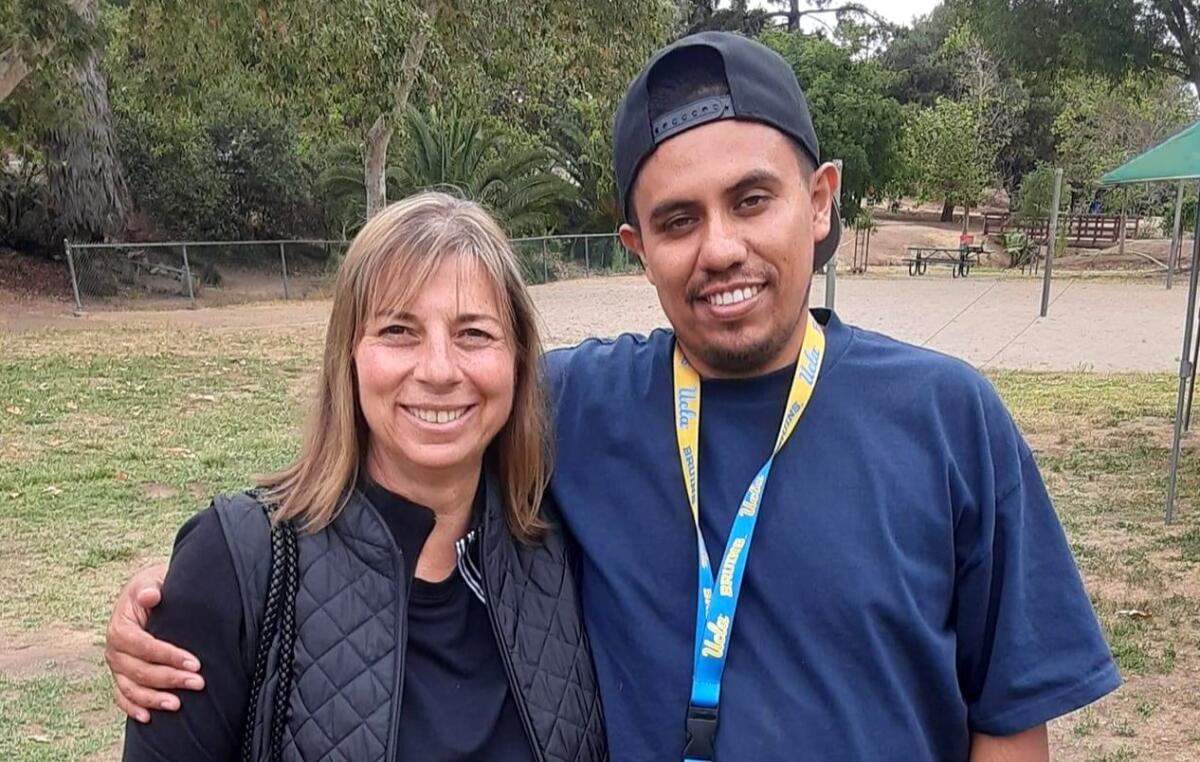
Kenney-Whitley, Ph.D., is the coordinator of the Rising Scholars program at Palomar College. She lives in North County.
In March 2020, I started a new job as the first staff person dedicated to a Palomar College program for incarcerated and formerly incarcerated students. I’d been teaching in the Vista Detention Facility since 2017 and, before that, worked extensively in communities impacted by cycles of mass incarceration; this move made sense for me. This timing coincided with the beginning of the COVID-19 pandemic, and I’d been on campus barely a week before the world was sent to set up home offices. My first task was to recruit students and assemble a cohort for two classes and a weekly activity designed for people to rehabilitate their lives through education — and all activities needed to be online. I had my work cut out for me in a climate that included what proved to be typical worries about things like disease-vulnerable family members and whether to wipe down groceries.
One of the first students I came into contact with was a man who, at the time, was in his late 20s. His name was Luis Bolaños Jiménez, and he was a student at our sister school, MiraCosta College. Luis explained that he’d previously been a Palomar College student, but he had been involved in an “incident” on campus in 2014 and wasn’t sure he’d be allowed to re-enroll at Palomar College. He needed only three more classes to transfer to a university, and he felt like he needed the support of a community, but MiraCosta College didn’t have a program for formerly incarcerated students yet. With much intelligence, vulnerability and honesty, Luis shared his story: His then-wife who’d been his sweetheart for nine years broke his heart in fall 2013. Devastated and suicidal, Luis went to the hospital three times to try to get help. He reached out to professors. He had a baby boy and wanted to be alive and healthy for his son.
But nobody provided him the support he needed, and he decided to take matters into his own hands: In the wee hours of Jan. 1, 2014, he went to campus with a gun and called the police on himself. His plan was to wait until officers surrounded him and then fire one shot in the air, knowing a barrage of bullets would end his life and his pain. Fortunately, he was able to talk with his mother-in-law, who convinced him to surrender to law enforcement, which he did.
Despite the fact that Luis was clearly struggling with mental health issues and tried to get help through the right channels, the system’s response to his suicide attempt was arresting Luis for bringing a gun on campus, an arrest that compounded his trauma. And when he was done serving time for that issue, ICE detained him for his lack of ironclad documentation, since he was brought to the U.S. as a child and remained in Escondido with his family.
The nature and gravity of Luis’ story is not atypical. But Luis was extraordinary in how he overcame such obstacles, and in 2020 he was ready to complete his associate degrees and move on to the bachelor’s. Fortunately, Palomar College administration granted him permission to re-enroll, and he became a leader of the 2020 summer cohort, a group of students who the college and its foundation supported by getting them laptops, Wi-Fi hotspots, books, program T-shirts, supplies and small stipends to help with basic needs. I remember meeting Luis in person for the first time at a credit union parking lot in Escondido and had no idea he would later become like family to me.
The cohort ended up being small but mighty with 15 students completing their courses. The group elected Luis to represent the cohort with a speech during the end of summer completion ceremony, and Luis was the easy choice to hire as a program peer mentor. As he finished his remaining courses and applied to transfer, he became instrumental in supporting other students with academics, technology and motivation. Helping other people made Luis feel whole, and Luis devoted himself to others’ success. While doing so, he continued to amass his own list of accomplishments, including starting college not knowing his multiplication tables but managing to ace three levels of calculus.
Luis and his peers shared their stories generously: Even with a COVID-19 backdrop, what was then known as “Transitions” (now Rising Scholars) grew its support on campus and in the community. Transitions had overwhelming backing at Palomar College since it began in 2018, but now these students had to add a pandemic to the list of obstacles to overcome and they did so against monumental odds: About half of people released from jails and prisons return within three years.
Palomar College Television learned about Rising Scholars around the same time as Luis was getting transfer acceptances from multiple universities. Palomar College Television has won over 35 Emmy awards for its documentaries, and producer/director Bill Wisneski quickly recognized how Luis and his Transitions/Rising Scholars brothers and sisters fed off one another, with justice-impacted program professors modeling that dynamic. Bill and his team decided to make a film about the program, and they selected Luis and Richard Boucon as the students they focused on. For over a year, Palomar College Television followed Luis and Richard, capturing how they grappled to overcome barriers like housing, employment, maintaining sobriety, mental health issues, basic needs, academics and relationships. In the film, “Almost Home: Life After Incarceration,” Luis also walks the audience through his 2014 suicide attempt.
In 2021, Luis decided to transfer to UCLA and received full funding and housing for him and his two young sons. In the film, Luis talks about continuing to struggle with his sobriety and mental health while at UCLA, a high-stakes environment where he couldn’t find the same sense of community he had helped create at Palomar College for so many other formerly incarcerated students. He managed to earn top grades as he pursued a bachelor’s degree in sociology, another in Chicano studies, and an education minor; he got accepted to the McNair Scholars program and engaged in the kind of research he planned to do in graduate school. In the film, however, he laughs as he talks about craving drugs and alcohol as a way to deal with immense pressure as a student and a single dad.
In June 2023, “Almost Home: Life After Incarceration” premiered at the TCL Chinese Theatre in Hollywood and won regional Emmy awards for best documentary and best director. Luis and Richard brought their families with them to Palm Springs to celebrate the occasion over Father’s Day weekend. Dressed in our best, everyone took turns posing with the awards, and the event centered around Luis and Richard. We all played together in the resort pool, and everyone enjoyed an indulgent brunch.
Tragically, it would be the last Father’s Day Luis’ boys would share with him. He had been trying to get support with his addiction, and he published in the Daily Bruin about these efforts in July 2023. In December 2023, however, seemingly impossible relationships combined with finals week and the holidays to overwhelm Luis, and he relapsed. Alcohol and drugs put the 33-year-old in a very dark place, and on Dec. 13, 2023, Luis took his own life, leaving behind his 8- and 11-year-old sons, his devoted mother, Silvia, and his beloved community of formerly incarcerated scholars, who he referred to as “my people.” Luis’ family and community remain stunned by this massive loss.
While I will never recover from the loss of someone who became a godson for me, I am consoled by his presence in “Almost Home: Life After Incarceration,” which we will continue to screen in hopes of contributing to systemic and policy changes that benefit incarcerated and formerly incarcerated students and people — and that enable more effective support for people with addiction.
Luis’ activist spirit continues to inspire all who knew him; with that mindset, Palomar College Television is collaborating with Luis’ family and loved ones to adapt the film and emphasize the need for more robust mental health support systems for formerly incarcerated people. We want the film to become an even louder call to action — and to honor and further Luis’ legacy of social reform. Rest in power, Luis. Your life and death will inspire me always, and you will continue to shine as the star you are.
Get Weekend Opinion on Sundays and Reader Opinion on Mondays
Editorials, commentary and more delivered Sunday morning, and Reader Reaction on Mondays.
You may occasionally receive promotional content from the San Diego Union-Tribune.
